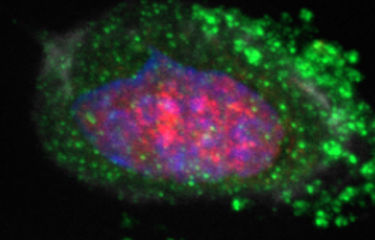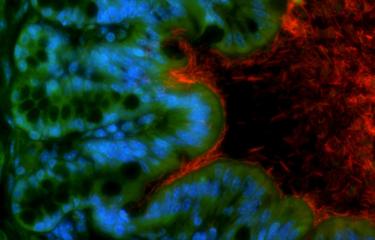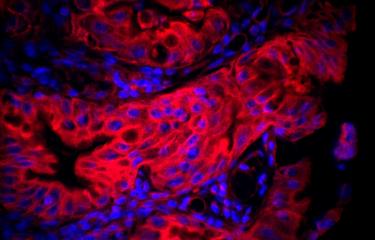What are the causes?
The bacterium H. pylori is a risk factor for stomach cancer.
H. pylori infection of the stomach is acquired during childhood and persists for decades or even an entire lifetime if left untreated. Infected individuals develop a strong local and humoral inflammatory response that gradually becomes established as a chronic condition.
H. pylori has thus been identified as the first bacterium directly implicated in cancer genesis.
How do the bacteria spread?
The bacteria are mainly spread orally among humans by such means as saliva and bodily fluids. The infection is acquired in early childhood, mostly through intrafamilial transmission (mother/child, siblings). The stakes are highest during childhood, since the risk of subsequent infection is very low among individuals not infected before the age of 10. Recently, many have pointed to environmental factors (particularly poor wastewater treatment), overcrowding due to poor socio-economic conditions and poor hygiene as sources of contamination or factors promoting the transmission of this infection.
What are the symptoms?
Symptoms of gastric ulcers include burning stomach pain exacerbated by eating, nausea, vomiting, weight loss and, in some cases, gastrointestinal bleeding. Symptoms of stomach cancer may be more subtle in the early stages and include indigestion, stomach pain, unexplained weight loss and vomiting, sometimes with blood.
In most individuals, chronic gastritis (inflammation of the mucosa lining the stomach) progresses free of further consequences and remains asymptomatic. A low proportion of patients (approximately 10% of infected individuals) go on to develop peptic ulcer disease and in 1% of cases, stomach cancer (adenocarcinoma).
However, data accumulated in recent years reveal that these two clinical presentations are mutually exclusive, and that progression to either of these diseases is dependent on hosts' genetic predisposition, environmental factors (particularly diet), and bacterial properties.
- Progression of H. pylori infection to peptic ulcer disease is associated with predominantly antral gastritis (in the lower part of the stomach) and hypersecretion of acid leading to the colonization and inflammation of the duodenum (the part of the small intestine located immediately after the stomach), in which the duodenal ulcer develops. H. pylori infection causes 95% of duodenal ulcers and 70% of gastric ulcers.
- Progression of H. pylori infection to atrophic gastritis followed by stomach cancer is generally associated with pangastritis (gastritis of the upper and lower parts of the stomach). It is generally observed in patients presenting with acid hyposecretion and is particularly prevalent in the over-50 age bracket.
How is the disease diagnosed?
In France, medical guidelines state that H. pylori infection should be diagnosed in two ways:
- Invasive biopsy-based tests allowing three separate examinations:
- A histological examination offering the twofold benefit of detecting the presence of H. pylori and identifying ulcerous or precancerous stomach lesions.
- A bacterial culture which offers the benefit of adjusting antibiotic treatment to the susceptibility of the isolated bacterium based on the results of an antibiogram.
- Molecular gene amplification tests enabling H. pylori to be detected quickly and its antibiotic susceptibility determined.
- Non-invasive tests
- A respiratory test: this test is also used to check that the eradication treatment has been successful three to four weeks after it has been discontinued.
- An H. pylori serologic assay that detects levels of antibodies directed against this bacterium in the bloodstream.
- Detecting H. pylori antigens in patients' stool samples.
What treatments are available?
A 7-day course of triple therapy combining a powerful inhibitor of gastric acid production (proton pump inhibitor or PPI) and two antibiotics (including amoxicillin, clarithromycin or metronidazole) is used to eliminate H. pylori infection. This approach enables the bacterium to be eradicated in 70% of cases. Factors in treatment failure include primary resistance to clarithromycin, which is encountered in approximately 30% of cases in France, and to metronidazole observed in at least 32% of cases, as well as poor compliance with treatment.
90% of patients recover from their infections following a second line of treatment adjusted to take account of bacterial susceptibility to antibiotics. However, for the past several years, a quadruple therapy known as Pylera has been prescribed due to the rising incidence of H. pylori strains resistant to antibiotics used in standard practice. It combines two antibiotics (metronidazole and tetracycline), an inhibitor of gastric acid production (PPI) and bismuth salts. Its eradication efficacy is approximately 95%.
Treatment eliminates the bacteria and symptoms of infection within just a few days. Inflammation persists for 6 to 24 months, after which the mucosa returns to its normal state.
How can the disease be prevented?
To prevent gastric ulcers, a healthy lifestyle is recommended:
- Do not smoke
- Consume alcohol in moderation
- Drink plenty of water
- Avoid acidic drinks
- Eat fresh fruit and vegetables
Who is affected?
Infection is more prevalent in developing countries (80 to 90%) than in industrialized nations (25 to 30%). The highest stomach cancer mortality rates are observed in East Asia, Eastern Europe, and Central and South American countries.
In France, stomach cancer is the 13th highest-ranking form of cancer in terms of incidence, with approximately 6,500 new cases diagnosed every year. Stomach cancer occurs rarely in subjects aged under 50 and is twice as common in men as in women.
Since it is often diagnosed in its advanced stages, the prognosis for stomach cancer is poor, with a 5-year survival rate of 15 to 20%.
H. pylori infection is one of the world's most widespread chronic infections, with between 20 and 90% of adults infected depending on the country. In a given country, prevalence varies according to individuals' socio-economic status, degree of overcrowding, and sanitation conditions in their living environment.
October 2024





